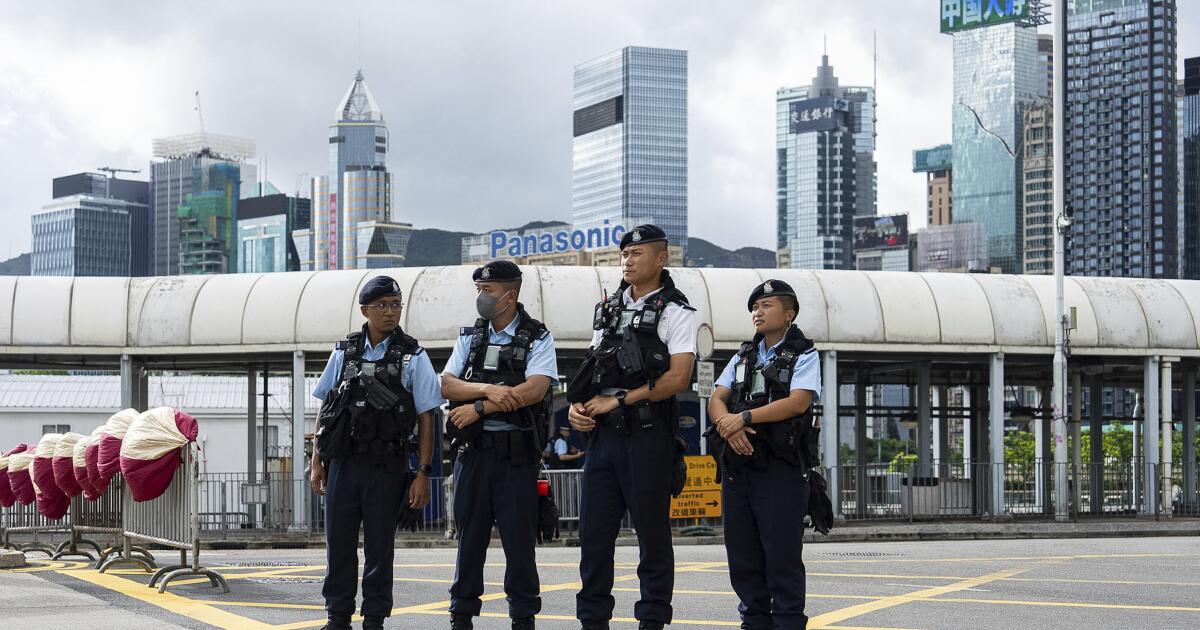HONG KONG — Hong Kong police announced rewards for information leading to the arrest of 19 overseas-based activists for their roles in what they called a subversive organization abroad, accusing them of violating a national security law imposed by Beijing.
Police said in a statement Friday that the group, Hong Kong Parliament, aimed to promote self-determination and establish a “Hong Kong constitution,” alleging it was using illegal means to overthrow and undermine China’s fundamental system or usurp the institutions in power in Hong Kong or Beijing.
At the request of the police, the city’s court issued arrest warrants for activists Elmer Yuen, Johnny Fok, Tony Choi, Victor Ho, Keung Ka-wai and 14 others. They are alleged to have organized or participated in an election abroad for the Hong Kong Parliament, as well as setting up or becoming members of the group.
According to a Facebook statement by the group on June 30, its election drew some 15,700 valid votes through mobile app and online voting systems. It said the candidates and elected members came from various regions, including Taiwan, Thailand, Australia, the U.S., Canada and Britain.
While the group calls itself Hong Kong Parliament, its electoral organizing committee was founded in Canada and its influence is limited.
Police already offered 1 million Hong Kong dollars, or about $127,400, for information leading to the arrest of Yuen, Ho, Fok and Choi when previous arrest warrants were issued against them. For the other 15, rewards of 200,000 Hong Kong dollars were offered, and residents were urged to provide information about the case or the people.
“The investigation is still ongoing. If necessary, police will offer bounties to hunt down more suspects in the case,” police said.
They also called on the wanted activists to stop their activities, saying that they hoped they “will take this opportunity to return to Hong Kong and turn themselves in, rather than making more mistakes.”
Yuen said in a Facebook Live broadcast that the election was not quite successful in drawing active participation, and that the police campaign would help the group rally support for the resistance movement.
“It helps us with a lot of advertising,” Yuen said.
During the live chat with Yuen, Sasha Gong, another activist targeted by the bounties, accused Hong Kong of becoming a police state. She said she is a U.S. citizen and would report her case to the American authorities and lawmakers.
Over the last two years, Hong Kong authorities have issued arrest warrants for various activists based overseas, including former pro-democracy lawmakers Nathan Law and Ted Hui. Authorities also canceled the passports of some of them under a recent security law introduced to the city last year.
The moves against overseas-based activists have drawn criticism from foreign governments, especially given the former British colony was promised that its Western-style civil liberties and semi-autonomy would be kept intact for at least 50 years when it returned to Chinese rule in 1997.
U.K. Foreign Secretary David Lammy and Home Secretary Yvette Cooper said in a joint statement that the warrants and bounties on people living in Britain are “another example of transnational repression,” and that the act encourages reckless behavior on U.K. soil.
In March, the United States sanctioned six Chinese and Hong Kong officials who it alleged were involved in “transnational repression” and acts that threaten to further erode the city’s autonomy.
Beijing and Hong Kong contend that the national security laws were necessary for the city’s stability. Hong Kong police have maintained that the Beijing-imposed law applies to permanent residents in Hong Kong who violate it abroad.
In retaliation for the U.S. move, China in April said it would sanction American officials, lawmakers and leaders of nongovernmental organizations who it says have “performed poorly” on Hong Kong issues.
Leung writes for the Associated Press.

